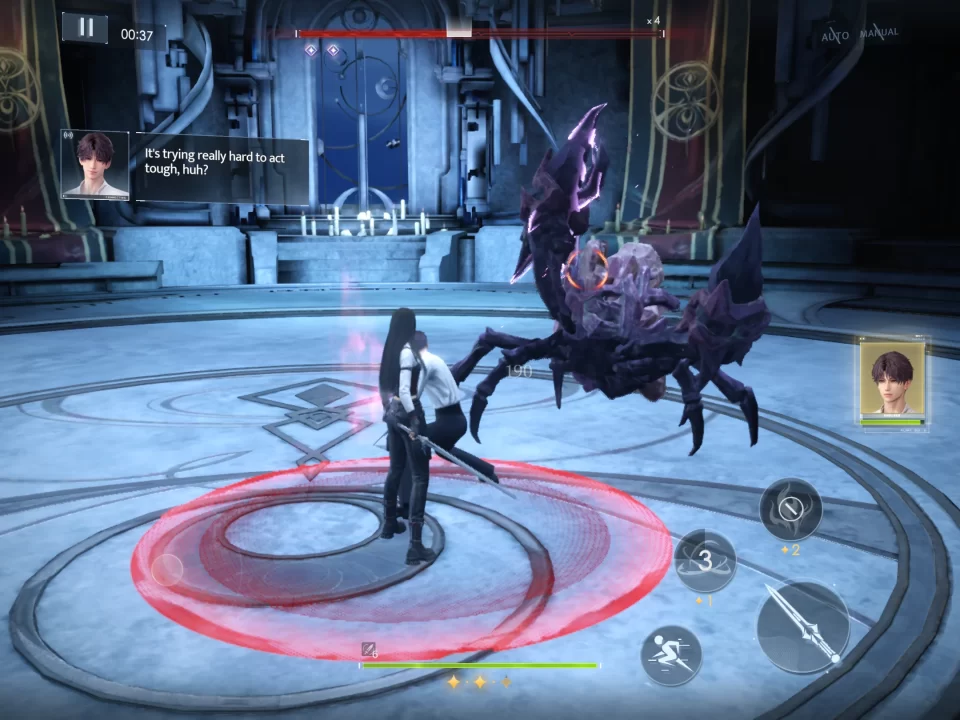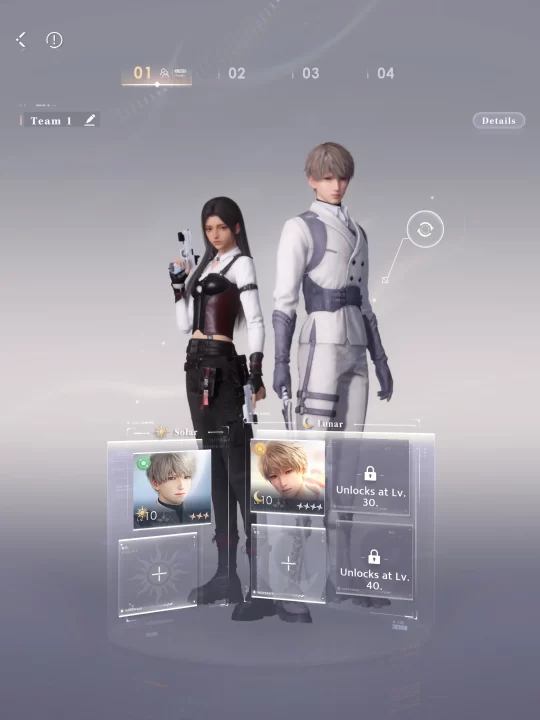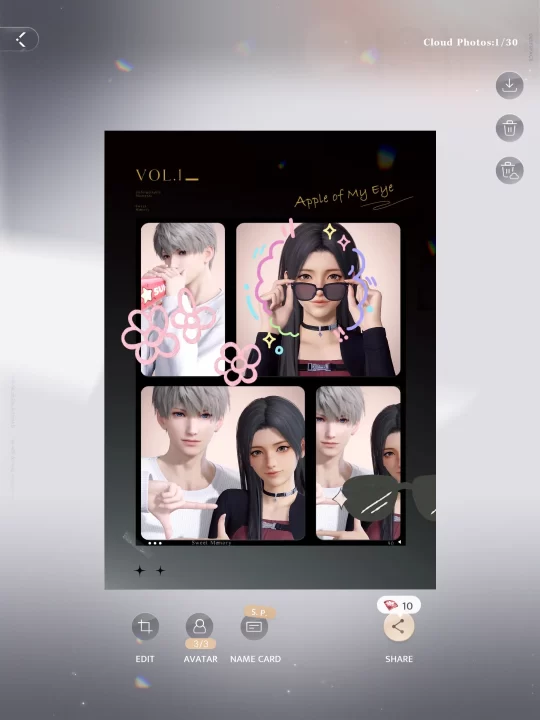When I first heard about it, I wasn’t sure what to make of the free-to-play mobile game Love and Deepspace. On paper, I find many of its separate components appealing. It’s a sci-fi otome with a mix of FMV dialogue cutscenes, a visual novel-style presentation, a surprisingly robust action RPG combat system, and some entertaining minigames. But do the gacha elements ultimately do the title in? Having spent significant time with Love and Deepspace, I’m pleasantly surprised at how entertaining I found the experience; however, that experience isn’t without caveats.
Love and Deepspace takes place far in humanity’s future when traveling into the title’s proverbial “deepspace” is quite feasible. Our protagonist, a fully customizable female character who I called Pip, lives in the technologically advanced Linkon City. Life in Linkon City seems pleasant, save for the ever-present threat of monsters known as Wanderers that suddenly appear without warning. Pip possesses a particular type of power known as Evol and carries with her a lingering injury from a traumatic encounter with a Wanderer. Pip joins a defense force known as the Hunters who are tasked with monitoring Wanderer activity and protecting the everyday citizenry from potential hazardous encounters. Pip’s new routine becomes participating in the Hunters’ search and destroy missions and visiting her adoptive grandmother and older brother figure Caleb. Still, things tragically change when she realizes that more nefarious things are occurring in Linkon City than random monster attacks. Can Pip solve the complicated mysteries and conspiracies she suddenly faces?
Love and Deepspace’s most vital selling points are its plot and central characters. The sci-fi writing is well done and believable, making Linkon City stand out from many free-to-play mobile games. I became invested in the storyline every time I moved it forward and was genuinely surprised when the plot went in some unexpected directions. There’s a lot of depth and lore inherent in the sci-fi storyline, and even side missions tend to have more plot focus than, say, the somewhat laughable “defend the villages” missions in Street Fighter: Duel. I don’t want to dive too much into the plot given some of the twists really do hit hard emotionally, but I became more invested in the story than I sometimes do with other otome titles, which is impressive given how often the game just blocks you from narrative progression until you reach a certain level requirement. Its surprise twist moments leave quite the impact.
Pip is quite likable and relatable. It’s easy enough to put yourself in her shoes thanks to the varied customizable options and the use of first-person perspective in story scenes. Yet, she maintains a consistent and rather endearing personality. She’s integral to the plot and feels like a genuine character in her own right rather than a mere blank slate self-insert for players. Her small family, especially the teasing and protective Caleb, have their moments to shine, as does her bubbly co-worker friend Tara. I’m surprised by just how much personality even minor unnamed characters show in Love and Deepspace, such as a sarcastic and long-suffering nurse having to put up with the antics of an eccentric wealthy patient. Thanks to the citizens of Linkon City, the game’s setting feels more real than what I’ve experienced in many other free-to-play mobile games.
Of course, this couldn’t be categorized as an otome if the game didn’t have potential love interests! With three available bachelors, Love and Deepspace features a relatively small number compared to other casts in the genre, but they’re proof of the saying “quality over quantity.” You first meet accomplished fellow Hunter Xavier during your first mission, with the aloof and seemingly indifferent young man becoming something of a partner in the field. Then there’s Doctor Zayne, a childhood friend with a somewhat icy disposition that hides his hidden warmth as he awkwardly expresses himself. Last is the artistic genius Rafayel, who has a very chaotic and unique way of viewing the world. I was most drawn to Xavier’s earnest demeanor and determined manner while playing. I especially loved how his relationship with Pip develops from a working partnership to friendship to gradually something more in the later scenes. However, Zayne’s obvious teasing affection and Rafayel’s mysterious charm and demand for attention also provide fantastic narrative moments. You learn more about all three characters as your affection levels with them grow, regardless of who you choose to spend the most time with. I’m rather glad about that because all three love interests are pretty likable and provide compelling backstories to the narrative. In my current playthrough, Rafayel hasn’t had much prominence in the main storyline compared to Zayne and Xavier, which is a shame since he’s also quite likable. If it weren’t for seeing his side-story content, I wouldn’t have much of a sense of his character.
While it makes the most narrative sense for Pip and Xavier to fight monsters while out on missions, you can sometimes team up with Rafayel and Zayne. During battle, you use a stylus to attack, activate abilities, and move around the battlefield while the AI controls your partner. Combat is surprisingly action-oriented and reminds me of a God Eater-lite system. Movement is frantic, and the action occurs in real time. Overall, the stylus-centered control scheme is relatively intuitive and easy to pick up. You can even invest in optional training to get more comfortable with combat! The fighting is relatively easy to grasp, with a lot of attack variety as you string together combos using regular weapon attacks or Evol abilities. It’s easy to pay attention to what the enemy is up to, thanks to red grids that appear on the battlefield floors.

The AI for the assist character is decent, and you can even have them unleash a special attack by quickly pressing their portrait once a meter fills. The ultimate goal in combat is to whittle down an opponent’s health until you do enough damage to shield break them, and then you go to town on them with added attack damage for a time. You also have a meter that gradually fills up, allowing you to perform a unique combat move with your partner for extra damage. There are also different weapons and fighting styles to choose from for both you and your partners. I preferred the dual guns myself, which is an action RPG oddity for me, but I like how they handle and that I can stay at farther distances from enemies.
Beyond choosing weapon styles, the “equipment” in-game consists of Memories, collectible cards featuring an image of one of the partner characters. When you select your partner character for a battle, you equip character-specific memories of said partner to your two-person battle party. Memories bolster stats such as health and attack power or defense, and they can be leveled up and strengthened to increase those bonuses further.
Thus comes the gacha elements, as leveling up Memories requires special items gained in limited quantities by playing the game or purchasing with real money. You can raise a Memory’s level to a certain point, but then you must have several corresponding elemental crystal shards to unlock its ascension levels. This repetitive cycle can take a long time if you’re unwilling to spend money on the game, though it’s still plausible, as I did for this review. Earning extras of a Memory allows you to increase its rank, increasing the number of bonuses you get from equipping it. You can even bolster a Memory by equipping “accessories” known as Protocores, which you gain through optional battles. The game’s equipment and leveling systems are robust. Each Memory has an elemental type that can match a battlefield’s type for extra protection. These elements create surprising strategies for which Memories you might pick.
There’s also a wealth of side content aside from the main story. Optional battles supply you with much-needed items, especially if you plan to play the game for free, as I do. There’s the obligatory gacha Wheel of Destiny to gain more Memories, and there’s the option to activate a timed search-and-find minigame if you have the items needed to initiate it. You can also see extra story content, share text messages with characters, receive calls, browse bulletins, decorate your in-game desk, and go on a virtual photo booth outing. There are also minigames such as a surprisingly fun kitty card game (where you match numbered cat cards to specific colors on a board for point-collecting purposes) and a claw machine that is pretty much a digital version of what you’d find in an arcade! I was pleasantly surprised by just how much stuff there is to do in Love and Deepspace, even when I was stuck waiting to level up enough to advance the main story.
That leads me to what is arguably Love and Deepspace’s biggest weakness: the gacha mechanics—if you’re attempting to play the game for free. Be prepared to wait a long time while advancing the main story because the game blocks you from progressing until you reach high enough levels. It isn’t as bad in the beginning stages. Still, the further along in the narrative you get, the more the level requirement increases, which also increases the number of memories you have to level up for fights. I sometimes found myself waiting days, if not weeks, before advancing since I might level up one character’s set of Memories only for the game to decide the next couple of fights require someone else’s. Being constantly stopped is frustrating, especially since the plot is well-written and enjoyable. Aside from your real-world money, there are also a ton of in-game currencies to keep track of, which can get confusing when shopping.
Graphically, Love and Deepspace is a gorgeous game. I love the simplicity of its visual novel presentation and its gorgeous FMV scenes, even when running in the lowest graphics performance mode. The backgrounds and character designs bring to life its futuristic and fantastical settings. The battle mode graphics are equally impressive! The game utilizes a horizontal orientation in combat areas, while it utilizes a vertical orientation in most other parts. Sound-wise, the English voice acting is decent, and the soundtrack makes for pleasant listening. I especially love the ethereal central vocal theme performed by the incredible Sarah Brightman. The script work is top notch, which is impressive considering how much text there is and how it is constantly updated.
Love and Deepspace is a surprisingly solid and enjoyable mobile game if you like action RPGs and have a soft spot for sci-fi and otome titles. I wish there were a way to have a full-length single-player experience without the interrupting gacha elements, but that’s the unfortunate nature of free-to-play titles. Despite that, I feel Love and Deepspace is an experience well worth trying if it seems intriguing to you regardless of those weak points. This is not something I can say for similar games I’ve played of this ilk before, save perhaps Another Eden: The Cat Beyond Time and Space and Genshin Impact. That’s a testament that what works well in Love and Deepspace ultimately surpasses what doesn’t.





